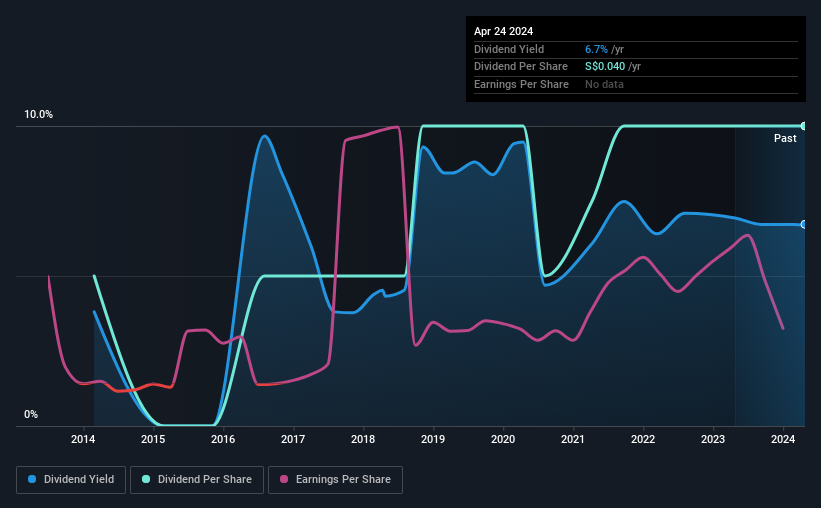Thakral (SGX:AWI) Has Announced A Dividend Of SGD0.02
The board of Thakral Corporation Ltd (SGX:AWI) has announced that it will pay a dividend of SGD0.02 per share on the 21st of May. This means the dividend yield will be fairly typical at 6.7%.
See our latest analysis for Thakral
Thakral's Earnings Easily Cover The Distributions
Unless the payments are sustainable, the dividend yield doesn't mean too much. Based on the last payment, Thakral's earnings were much higher than the dividend, but it wasn't converting those earnings into cash flow. No cash flows could definitely make returning cash to shareholders difficult, or at least mean the balance sheet will come under pressure.
Unless the company can turn things around, EPS could fall by 2.1% over the next year. Assuming the dividend continues along recent trends, we believe the payout ratio could be 68%, which we are pretty comfortable with and we think is feasible on an earnings basis.
Dividend Volatility
The company has a long dividend track record, but it doesn't look great with cuts in the past. Since 2014, the dividend has gone from SGD0.02 total annually to SGD0.04. This works out to be a compound annual growth rate (CAGR) of approximately 7.2% a year over that time. It's good to see the dividend growing at a decent rate, but the dividend has been cut at least once in the past. Thakral might have put its house in order since then, but we remain cautious.
Dividend Growth May Be Hard To Achieve
With a relatively unstable dividend, it's even more important to see if earnings per share is growing. Over the past five years, it looks as though Thakral's EPS has declined at around 2.1% a year. Declining earnings will inevitably lead to the company paying a lower dividend in line with lower profits.
The Dividend Could Prove To Be Unreliable
Overall, it's nice to see a consistent dividend payment, but we think that longer term, the current level of payment might be unsustainable. While the low payout ratio is a redeeming feature, this is offset by the minimal cash to cover the payments. We don't think Thakral is a great stock to add to your portfolio if income is your focus.
Market movements attest to how highly valued a consistent dividend policy is compared to one which is more unpredictable. Still, investors need to consider a host of other factors, apart from dividend payments, when analysing a company. For example, we've picked out 4 warning signs for Thakral that investors should know about before committing capital to this stock. Is Thakral not quite the opportunity you were looking for? Why not check out our selection of top dividend stocks.
Have feedback on this article? Concerned about the content? Get in touch with us directly. Alternatively, email editorial-team (at) simplywallst.com.
This article by Simply Wall St is general in nature. We provide commentary based on historical data and analyst forecasts only using an unbiased methodology and our articles are not intended to be financial advice. It does not constitute a recommendation to buy or sell any stock, and does not take account of your objectives, or your financial situation. We aim to bring you long-term focused analysis driven by fundamental data. Note that our analysis may not factor in the latest price-sensitive company announcements or qualitative material. Simply Wall St has no position in any stocks mentioned.

 Yahoo Finance
Yahoo Finance 
